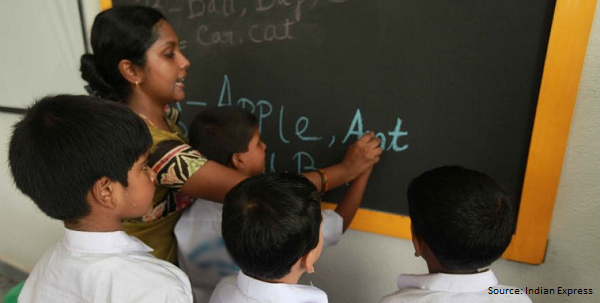
Teachers’ Concerns and how these Affect Students and Educational Policies
27 November 2018
State planners need to get at the heart of what motivates teachers to put in their best at school and address their work concerns, before piling more responsibilities on them.
 A few months ago, my colleague and I conducted a focus group with seven teachers from a government school in Delhi. The discussion was conducted with the aim to get teachers to reflect on their experience of working in government schools. We kicked off the discussion by presenting a vignette of a recent graduate and professionally trained teacher, who had been newly appointed to their school. We then asked the group to address the new appointee on her first day at work and to give her any advice they felt would help her at that stage. ‘Don’t be disappointed!’ said the youngest teacher, the first to respond in the group. After a moment of silence she continued addressing the hypothetical teacher:
A few months ago, my colleague and I conducted a focus group with seven teachers from a government school in Delhi. The discussion was conducted with the aim to get teachers to reflect on their experience of working in government schools. We kicked off the discussion by presenting a vignette of a recent graduate and professionally trained teacher, who had been newly appointed to their school. We then asked the group to address the new appointee on her first day at work and to give her any advice they felt would help her at that stage. ‘Don’t be disappointed!’ said the youngest teacher, the first to respond in the group. After a moment of silence she continued addressing the hypothetical teacher:
‘You have learnt many things in your B.Ed programme…We learn many theoretical things but reality is quite different so we need to adapt to their (students’) needs, requirements of the school…the school conditions…you will have to alter your teaching methods, working techniques according to the students… And don’t get disappointed when you don’t manage to get the results you expected from them. The background of students is low compared to what we expect so results are also low compared to what we learn in college…cooperation from parents’ side is also a bit low…don’t get disheartened. Do your best. Sooner or later you will get good results.’
The other teachers hummed and nodded in agreement as she spoke.
I found this teacher’s response quite insightful. She revealed so much about her experience as a teacher – her expectations, her disappointments, her biases – through this thoughtful reflection. As the discussion rolled on, it became apparent that her response had succinctly summarised the group’s collective experience and expectations from their job. I found myself dipping into my own knowledge of teachers’ experiences at their job, gathered over the years, and I could not help but think how government teachers across states articulated their job related interests and concerns in what seemed like a scripted fashion. So what have I learnt about teachers’ interests and these oft repeated concerns?
Incentives of teaching in government schools
I have learnt that individuals join government schools as teachers for a variety of interlinked reasons. Some of the commonly cited reasons are for the joy of teaching or spending time with children, drawing a steady income (‘it’s just a job!’), and being able to maintain a healthy work-life balance. The last reason is particularly important for many women as they are expected to manage domestic affairs after school hours. For this reason, the profession is often touted as the most ‘appropriate for women’. The perks that come along with being employed in the public sector, such as job security, expectation that the workload will be less compared to private sector jobs, high salaries, and consistent salary increments, are compelling factors for most applicants.
Further, many perceive teaching as a noble profession and/or a vocation. For these individuals, being identified as teachers, the respect associated with the profession, and the significance of the job are ipso facto important incentives. Yet other teachers in the public education system prioritise being a ‘government employee’ over being a ‘teacher’, and they often harbour plans to move up the government hierarchy, irrespective of the sector. In such cases, teaching at a government school is viewed as a stepping stone to bigger and better opportunities, while still being able to draw benefits of being securely employed in the public sector.
But for many teachers the experience of working in the public education system often belie personal expectations.
Teachers or government employees?
Once teachers enter the public education system, they find themselves underprepared to cope with non-teaching tasks. These include the quantum of recordkeeping work and the amount of time it takes to counsel students and parents who tend to overwhelmingly hail from economically and socially weaker sections compared to the teachers. We have frequently observed teachers filling out forms for parents and students, spending a lot of time explaining official or administrative matters to parents who are often unable to fill out paperwork themselves. Teachers also spend time educating and sensitising both parents and students about social issues such as child marriage, drug abuse, and health and hygiene.
Time spent on these activities is ‘invisible’ in that it is not accounted for by education planners. No one has a clear estimate of how much time, skill and energy such demanding yet critical tasks take up. Teachers also have to learn administrative tasks such as maintaining salary accounts, bills etc. on the job – tasks which are very different from their basic job profiles. We often hear of teachers bungling up records as a result and spending more time rectifying errors.
Teachers in many states continue to largely function in resource strapped settings, with poor infrastructure and high student density, which only add to the challenges teachers are not prepared for or expect upon entering the school system. In most states, records continue to be manually maintained in different hardcopy formats. Even in a resource rich state like Delhi, where government schools are equipped with computers and have internet connectivity, records are still maintained manually (either because they are ordered by higher officials or by habit) even though almost all information is also submitted electronically. This only doubles the time spent on non-teaching tasks. In Delhi, the issue of student absenteeism is also rampant as many students hail from families that frequently migrate, which leaves teachers struggling to effectively meet curricular expectations put on them.
Moreover, by virtue of being government school teachers, one finds the schools enmeshed in a deeply hierarchical and bureaucratic setup. This means that schools don’t just function as organised sites for facilitating teaching-learning but also double up as last mile offices of various government departments. The Right to Education Act (2009) allows teachers to be involved in decennial census, election and disaster management duties.
In a yet to be released report, my colleagues and I at the Accountability Initiative explore this dilemma of juggling dual professional identities – that of a teacher and of a government employee – and the consequences it has on teachers’ day to day functioning. These identities and the associated tasks often clash, and this affects teacher performance and morale. The issue is further compounded by the mismatch in teachers’ work expectations and planners’ expectations of them.
Voices that (incidentally) shape the ‘change narrative’ in schools
The impact of these intangible factors on that most popular of indicators to measure the success of teaching-learning interventions – student pass percentages – needs to be systematically studied. The effects of these factors also merit serious consideration since teachers, like any other workforce, need to feel motivated, competent and equipped for their job to meet their goals effectively. Interventions to improve teaching-learning imparted in schools continue to see limited results owing to a number of systemic roadblocks, and these include mismatch in teacher work expectations and their job preparedness vis a vis the state’s demands on them as teachers and as government employees.
In the past I have also discussed how difficult it is to develop and implement “evidence based” policies at the scale and conditions under which Indian states operate. A reflection of that is the way reform interventions continue to be designed and implemented in a formulaic manner – a thin leadership at the top plans and pushes the change agenda; basic orientation or bare minimum training is given to the workforce to execute the tasks expected of them. Monitoring is done through reports produced by frontline actors which carry quantifiable but limited indicators that do not shed light on the process by which the numbers are generated. Punitive measures are taken in cases of insubordination; and the frontline workforce continues to mechanically follow the basic acts required of them, transmitting reports upwards, without necessarily investing in the reform agenda.
“Change management” as a concept is altogether missing from the lexicon of most planners. One sees interventions being introduced and wrapped up arbitrarily, leaving frontline actors to grapple with the meaning and consequences of the same. Further, whipping teachers into action by applying punitive measures, especially in the case of interventions aiming to improve teaching-learning practices is also not effective in the long run. Such programmes require teachers to “input” intangible acts like ‘care’, ’empathy’ and ‘commitment’ in the mix of activities inside classrooms, apart from applying the technical skills of teaching. It is hard to get actors to truly care if there is little buy in for a programme or, at the outset, the implementing actors’ job expectations, job preparedness and work conditions are not in sync with the dual set of responsibilities put on of them.
The intent of this commentary was to introduce yet another layer of complexity in dialogues pertaining to education reforms. Initiating discussions on teacher interest, concerns and work conditions can and should also stimulate discussions on modifying pre and in-service training and teacher recruitment to suit the needs of the students being catered to by government schools.






